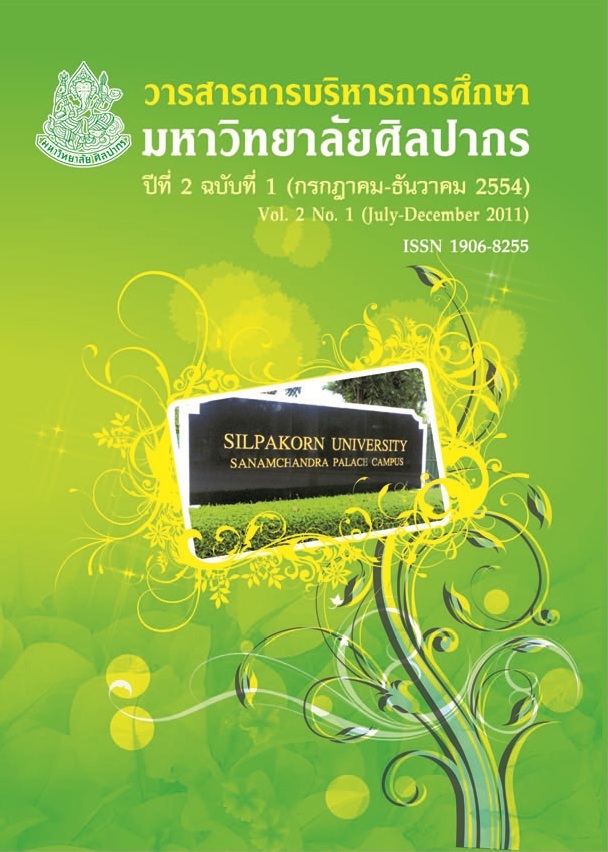การปรับเปลี่ยนวัฒนธรรมองค์การที่ส่งผลต่อการส่งเสริมการวิจัยในโรงเรียน
คำสำคัญ:
การปรับเปลี่ยนวัฒนธรรมองค์การ, การส่งเสริมการวิจัย, ORGANIZATIONAL CULTURE CHANGE, RESEARCH PROMOTIONบทคัดย่อ
การวิจัยนี้ใช้ระเบียบวิธีวิจัยเชิงพรรณนามีวัตถุประสงค์ของการวิจัยเพื่อทราบ 1) องค์ประกอบของการปรับเปลี่ยนวัฒนธรรมองค์การของโรงเรียน 2) องค์ประกอบการส่งเสริมการวิจัยในโรงเรียน และ 3) การปรับเปลี่ยนวัฒนธรรมองค์การที่ส่งผลต่อการส่งเสริมการวิจัยในโรงเรียน ขั้นตอนการดา เนินการวิจัยมี 3 ขั้นตอน คือ ขั้นตอนที่ 1 การวิเคราะห์องค์ประกอบการปรับเปลี่ยนวัฒนธรรมองค์การและองค์ประกอบการส่งเสริมการวิจัยในโรงเรียน ขั้นตอนที่ 2 การวิเคราะห์ความสัมพันธ์เชิงสาเหตุของการปรับเปลี่ยนวัฒนธรรมองค์การที่ส่งผลต่อการส่งเสริมการวิจัยในโรงเรียน และขั้นตอนที่ 3 การตรวจความเหมาะสมโดยผูเ้ ชี่ยวชาญ เครื่องมือเก็บรวบรวมข้อมูลคือ 1) แบบสัมภาษณ์แบบไม่มีโครงสร้าง 2) แบบสอบถามความคิดเห็น และ 3) แบบตรวจสอบความเหมาะสม กลุ่มตัวอย่างของการวิจัย คือ โรงเรียนเทศบาลสังกัดองค์กรปกครองส่วนท้องถิ่นที่จัดการศึกษาระดับประถมศึกษาครบชั้นเรียน (ชั้นประถมศึกษาปี ที่1 ถึงชั้นประถมศึกษาปีที่ 6 จานวน 79 โรงเรียน ผู้ให้ข้อมูลโรงเรียนละ 4 คน ประกอบด้วย ผู้อานวยการสถานศึกษารองผู้อำ นวยการสถานศึกษาฝ่ายวิชาการ พนักงานครูเทศบาลที่ปฏิบัติหน้าที่หัวหน้ากลุ่มสาระการเรียนรู้ และพนักงานครูเทศบาล รวมทั้งสิ้น 316 คน สถิติวิเคราะห์ข้อมูล ได้แก่ ค่าความถี่ (frequency) ค่าร้อยละ (percentage) ค่าเฉลี่ย (arithmetic mean) ส่วนเบี่ยงเบนมาตรฐาน (standard deviation) สถิติวิเคราะห์ตัวประกอบประเภทการวิเคราะห์องค์ประกอบเชิงสารวจ (exploratory factor analysis) สถิติวิเคราะห์ความสัมพนั ธ์เชิงสาเหตุ (path analysis) และการวิเคราะห์เนื้อหา (content analysis)
ผลการวิจัยพบว่า
1. องค์ประกอบการปรับเปลี่ยนวัฒนธรรมองคก์การของโรงเรียน ประกอบด้วย 5 องค์ประกอบ คือ 1) ผู้นำการเปลี่ยนแปลง 2) การนิเทศและประเมินผล 3) ความผูกพัน 4) การมีส่วนร่วม และ 5) องค์กรแห่งการเรียนรู้
2. องค์ประกอบการส่งเสริมการวิจัยในโรงเรียน ประกอบด้วย 4 องค์ประกอบ คือ 1) การจัดการความรู้ 2) การพัฒนาวิชาชีพ 3) บทบาทหน้าที่ของผู้บริหาร และ 4) การพัฒนาทรัพยากรมนุษย์
3. ความสัมพันธ์เชิงสาเหตุของการปรับเปลี่ยนวัฒนธรรมองค์การที่ส่งผลต่อการส่งเสริมการวิจัย ในโรงเรียนประกอบด้วยพหุองค์ประกอบที่มีความสัมพันธ์กัน ซึ่งมีความเหมาะสม ความเป็ นไปได้ เป็นประโยชน์และถูกต้องครอบคลุมสอดคล้องกับกรอบแนวคิดเชิงทฤษฎีของการวิจัย
ORANIZATIONAL CULTURE CHANGE EFFECTING RESEARCH PROMOTION IN SCHOOLS
The purposes of this descriptive research were to determine 1) the components of an organizational culture change of schools 2) the components of research promotion in schools and 3) the model of the organizational culture change effecting the research promotion in schools. The research comprised 3 procedures as follow: firstly, analytical study to set the components of the organizational culture changes of schools and components of research promotion in schools. Secondly, present a proposed organizational culture change effecting the research promotion in schools and thirdly confirmation a model by path analysis indicators of organizational culture change and research promotion by the expertise. The instruments employed for data collection were an unstructured interview, an opinionnaire and checklist form. The sample in this research was 79 basic education municipal schools of department of local administration. The respondents were school director, deputy director of academic affairs, academic department’s chief and teacher totaling 316 people.The statistics for analyzing the data were frequencies, percentage, arithmetic mean, standard deviation, exploratory factor analysis, path analysis and content analysis.
The findings were as follows:
1. The components of the organizational culture change of schools consisted of five components which were; 1) transformational leadership 2) supervision and evaluation 3) commitment 4) participation and 5) learning organization.
2. The components of the research promotion in schools consisted of four components which were; 1) knowledge management 2) professional development 3) role/functions of school administrator and 4) human resource development.
3. The organizational culture change effecting the research promotion in schools consisted of multivariables relation which were found propriety, feasibility, utility and accordance with research theoretical frameworks.




